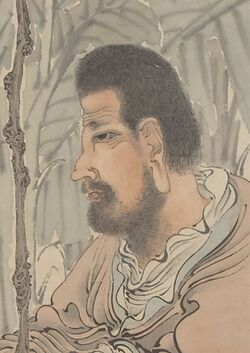Biography:Zhidun
Zhidun (Chinese: 支遁; pinyin: Zhīdùn; Wade–Giles: Chih-tun; 314-366 CE) was a Chinese Buddhist monk and philosopher. A Chinese author, scholar, and confidant of Chinese government officials in 350 CE, he claimed that all who followed Buddhism would, at the end of their life, enter Nirvana.[1]
In his book, A Short History of Chinese Philosophy, Feng Youlan recounts a story from the Shishuo Xinyu regarding Zhidun's fondness for cranes:
"Once a friend gave him two young [cranes]. When they grew up, Chih-tun was forced to clip their wings so that they would not fly away. When this was done, the cranes looked despondent, and Chih-tun too was depressed, and said: "Since they have wings that can reach the sky, how can they be content to be a pet of man?" Hence when their feathers had grown again, he let the cranes fly away."[2]
References
- ↑ Berkowitz, Alan J. (2000). Patterns of Disengagement: The Practice and Portrayal of Reclusion in Early Medieval China. Stanford, California: Stanford University Press. p. 143. ISBN 9780804736039. https://books.google.com.tw/books?id=tCCUlW3Wvh4C&pg=PA227&lpg=PA227&dq#v=onepage&q&f=false. Retrieved 1 November 2015.
- ↑ Fung, Yu-lan (1966). A Short History of Chinese Philosophy. New York, N.Y.: Free Press-MacMillan Publishing Co., Inc.. pp. 236-237.


